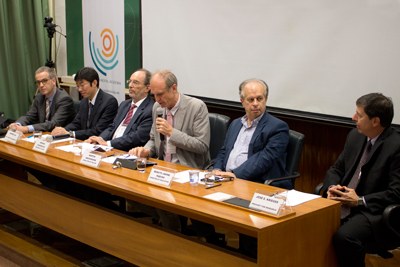Opening of the Intercontinental Academia Highlights the Project’s Uniqueness and Relevance
The opening session of the Intercontinental Academia (ICA), which took place on the evening of April 17 at USP’s Medical School, was marked by the enthusiasm of all those present for the uniqueness of the project and its importance for scientific and cultural cooperation between scholars from different countries, institutions and fields of knowledge.
The minister of Education, Renato Janine Ribeiro, who is a member of IEA’s Scientific Committee in the project, stressed the significance of this initiative to integrate people with various cultural and academic backgrounds at a time when words like “knowledge” and “wisdom” have acquires various meanings and when “there are so many doubts about what to do with knowledge, and wisdom is no longer a constant in science.”
 The president of the National Council for Scientific and Technological Development (CNPq), Hernan Chaimovich, who is also a member of IEA’s Scientific Committee, said that the ICA is an example of “non canonical” activity that must play a greater role in the training of scholars: “The choice of one subject to be analyzed by people from different cultures and backgrounds has an extremely rich intellectual relevance; it is an example of how to overcome interdisciplinarity and achieve an academically competitive transculturality anywhere in the world.” Chaimovich also stressed the quality of the scientific profile of the young scholars selected for the project.
The president of the National Council for Scientific and Technological Development (CNPq), Hernan Chaimovich, who is also a member of IEA’s Scientific Committee, said that the ICA is an example of “non canonical” activity that must play a greater role in the training of scholars: “The choice of one subject to be analyzed by people from different cultures and backgrounds has an extremely rich intellectual relevance; it is an example of how to overcome interdisciplinarity and achieve an academically competitive transculturality anywhere in the world.” Chaimovich also stressed the quality of the scientific profile of the young scholars selected for the project.
USP’s dean of Research, José Eduardo Krieger, represented the president of the university, Marco Antonio Zago, at the ceremony. Krieger, who is chairman of IEA’s Scientific Committee, said the project contributes to leverage the most productive formats of scientific collaboration networks. He also drew attention to the fact that the ICA is characterized by interdisciplinarity and the integration of young researchers, “who will play an important role in the society of their home countries.”
Carsten Dose, from the Institute of Advanced Studies of the University of Freiburg (Germany), general secretary of the project, congratulated all participants on behalf of all the institutes for advanced study that comprise the Ubias network (University-Based Institutes for Advanced Study), ICA’s mother organization. He said the materialization of the proposal that emerged in 2012 is a clear demonstration of how Ubias’ member institutes can work together. Dose also paid tribute to the former director of the IEA, César Ades (1943-2012), who attended the meeting that established Ubias in October 2010 and impressed everyone with his enthusiasm for the new entity.The director of the IEA, Martin Grossmann, presented the history and characteristics of the project, explaining that side by side with reflections on the concepts of time in various sciences, other activities and discussion topics were also included, such as a discussion on the future of the university and the development of a MOOC (Massive Open Online Course), a free course about time to be offered via the Web.
Dapeng Cai, from the Institute for Advanced Research (IAR) at Nagoya University (Japan), a partner of the IEA in the implementation of the ICA, highlighted the efforts to bring about this project and the importance of the final product being a MOOC about time. In his view, the creation of a MOOC shows that the ICA, in addition to enabling the sharing of knowledge among all scholars involved, is also concerned with sharing results with the public at large.
